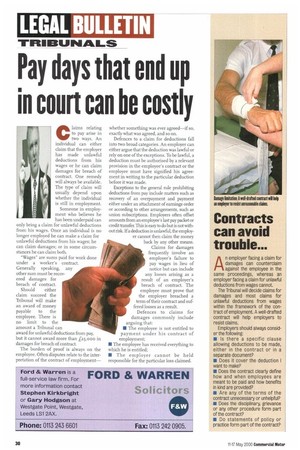Pay days that end up in court can be costly
Page 32

If you've noticed an error in this article please click here to report it so we can fix it.
Claims relating to pay arise in two ways. An individual can either claim that the employer has made unlawful deductions from his wages or he can claim damages for breach of contract. One remedy will always be available. The type of claim will usually depend upon whether the individual is still in employment.
Someone in employment who believes he has been underpaid can only bring a claim for unlawful deductions from his wages. Once an individual is no longer employed he can make a claim for unlawful deductions from his wages; he can claim damages; or in some circumstances he can claim both.
"Wages" are sums paid for work done under a worker's contract.
Generally speaking, any other sum must be recov ered damages for breach of contract.
Should either claim succeed the Tribunal will make an award of money payable to the employee. There is no limit to the amount a Tribunal can award for unlawful deductions from pay, but it cannot award more than £25,000 in damages for breach of contract.
The burden of proof is always on the employee. Often disputes relate to the interpretation of the contract of employment—
whether something was ever agreed—if so, exactly what was agreed, and so on.
Defences to a claim for deductions fall into two broad categories. An employer can either argue that the deduction was lawful or rely on one of the exceptions. To be lawful, a deduction must be authorised by a relevant provision in the employee's contract or the employee must have signified his agreernent in writing to the particular deduction before it was made.
Exceptions to the general rule prohibiting deductions from pay indude matters such as recovery of an overpayment and payment either under an attachment of earnings order or according to other arrangements, such as union subscriptions. Employers often offset amounts from an employee's last pay packet or credit transfer. This is easy to do but is not without risk Ifa deduction is unlawful, the employer cannot then claim the money back by any other means. Claims for damages frequently involve an employer's failure to pay wages in lieu of notice but can include any losses arising as a result of an employer's breach of contract. The employee must prove that the employer breached a term of their contract and suffered losses as a result.
Defences to claims for damages commonly include arguing that: • The employee is not entitled to payment under his contract of employment; • The employee has received everything to which he is entitled; • The employer cannot be held responsible for the particular loss claimed.




































































































